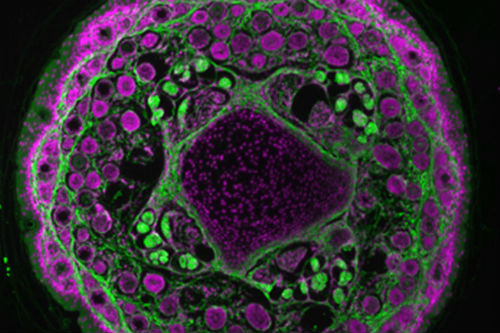Cells are the fundamental building blocks of life, responsible for the maintenance and repair of connective tissues such as skin, tendon and cartilage. Cells are protected from the environment by an extracellular matrix, without which, connective tissues would be nothing but an amorphous slurry. Yet how these matrices are formed and work is an area of knowledge that has, to date, been relatively unexplored.
The joint award, led by Professor Karl Kadler at the University of Manchester, was made by the BBSRC as part of its strategic Longer Larger (sLoLa) grants call in Frontier Bioscience, which aims to advance our understanding of the fundamental biology of living systems.
David Stephens, Professor of Cell Biology from the University of Bristol’s School of Biochemistry, who is leading the Bristol component said: “This is an exciting opportunity to combine our expertise to make frontier breakthroughs in our understanding and ultimately to improve human health.”
The collaboration will focus on the cell biology of matrix synthesis, how the component molecules are transported within cells and secreted, the circadian timing mechanisms that coordinate these processes, and the interactions between the immune system and matrix.
Researchers from Manchester (Oliver Jensen, Karl Kadler, Martin Lowe, Qing-Jun Meng, and Joe Swift) and Bristol (Chrissy Hammond, Paul Martin, David Stephens and Nicola Stevenson) will pool their multidisciplinary expertise in fundamental aspects of cell and tissue biology, integrated experiments using in vitro and in vivo models, circadian biology, mathematical modelling, and novel synthetic scaffolds, with a particular focus on how the collagen matrix is controlled in the short term across a circadian cycle and, in the long term, across the life course.
Changes to collagen underpin many of the changes associated with ageing, such as loss of skin elasticity, poor wound healing, fibrosis, susceptibility to fracture and osteoarthritis. The team will investigate how collagen is made and how it is used in the body, how it responds to damage, and how the day/night cycle and our immune systems affect this.
Professor Stephens added: “Most people will experience reduced quality of life due to a failure of collagen maintenance. Yet, despite its clear fundamental importance, we still do not fully understand how synthesis of the precursor procollagen, export from the cell, assembly and maintenance of the collagen network are regulated.”
Professor Karl Kadler added: “Advances in understanding how tissues develop, are maintained, repaired and age, requires the collective effort of a multidisciplinary team of molecular cell biologists, immunologists, biochemists, circadian clock biologists, wound healing experts and mathematicians, will benefit the health science strategy across UKRI, charity funders, and industry.”
